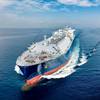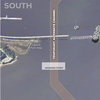The IMO Maritime Safety Committee’s Intersessional Working Group on Maritime Security (ISWG), which met from February 11-15, 2002, has progressed work on all items on its agenda and its report contains the following recommendations to the May 2002 meeting of the Maritime Safety Committee (MSC 75) for further elaboration.
1. To accelerate the implementation schedule for the mandatory fitting of Automatic Identification Systems for all ships of 500 gross tonnage and above, on international voyages. The final implementation date would be decided by a Diplomatic Conference on maritime security, scheduled for December 2002.
2. To amend SOLAS chapter XI to include special measures for maritime security and to amend the title accordingly. The general idea for consideration by MSC 75 is to incorporate new regulations XI/5 to 7 containing definitions, requirements for ships and requirements for port facilities respectively, supported by a draft International Code for the Security of Ships and Port Facilities, which should have a mandatory section.
3. To require by the Code all ships of 500 gross tonnage and above engaged in international voyages to carry ship security plans (SSPs). The need for such plans to be ultimately incorporated in the ISM Code was acknowledged. It was considered essential that the mandatory requirements relating to such plans should be developed prior to the Diplomatic Conference on maritime security.
4. To include a requirement for a Ship Security Officer (SSO) in the Code. The training needs of this officer to be developed in the context of the STCW Convention and that initially his/her responsibilities should include any necessary instruction to the crew of the ship. Training requirements for the SSO would need to be developed as a matter of urgency.
5. To incorporate a requirement for a Company Security Officer (CSO) including responsibilities and training requirements in the Code.
6. To recommend to MSC 75 to incorporate a requirement for port facility security plans (PFSP), but addressing only the Ship Port Interface, which needed further identification and definition and to stipulate which ports it would apply to. MSC will be invited to authorize more detailed work to be undertaken in close co-operation with ILO on comprehensive PFSP requirements. There was concern that it may not be appropriate to require such plans for small ports.
7. Port Vulnerability Assessment (PVA) was considered an essential part of the port facility security process and it was agreed to incorporate a new requirement for PVA in the Code and develop guidance/criteria for PVA based on the existing level of threat.
8. Urgent action on an up-to-date seafarer identification document. The Secretary-General of IMO has written to the Director-General of the International Labour Organization (ILO), emphasising the importance the Member States of IMO give to updating the ILO seafarer identification document as a significant contribution to enhanced maritime security and requesting early action on this matter, offering the assistance of IMO in this process. It was hoped that the ILO Director-General would bring this matter to the attention of his governing body in March 2002, proposing that a new protocol to amend the ILO Seafarers’ Identity Documents Convention of 1958 (No. 108) be developed for adoption by the ILO General Conference in June 2003.
9. Information on the ship, its cargo and people: full transparency of ownership information was desirable, but could be difficult to achieve. Nevertheless the owner of a ship needed to be defined in future, bearing in mind that many IMO instruments place responsibilities on the shipowner, who may, however, not be easy to identify. Proposals will be referred to the Legal Committee for comments on the effective control of the ship; the issue should be further considered at MSC 75, based on substantive proposals submitted.
10. The Sub-Committees on Radiocommunications and Search and Rescue (COMSAR), Ship Design and Equipment (DE) and Safety of Navigation (NAV) to be requested to consider means for providing a capability for seafarers to activate an alarm to notify authorities and other ships of a terrorist hijacking, including a recommendation on whether such an alarm should be surreptitious.
11. A recommended formalization of co-operation with the World Customs Organization (WCO) on the question of container inspection and ensuring that the effective and efficient flow of multi-modal cargo is maintained, in spite of the need for cargo security. IMO should work together with WCO through an appropriate mechanism with the aim of establishing international measures that would enhance the integrity of all cargo. In view of the annual volumes of containers being moved globally (about 150 million full and 40 million empty container movements in 2001), the ISWG considered this issue to be a particularly complex and difficult one to solve in the short term. Facilitation of maritime traffic needed to be balanced against the desire for maritime security.
12. DE 49 (meeting in March) is to consider the issue of maritime security equipment to prevent unauthorized boarding in ports and at sea and report to MSC 75. It was recognized that the kind of equipment to be used on board would largely depend again on risk assessment (e.g. ship types, trading areas, etc.) and impacted on the SSP and the interface between SSO and CSO. If appropriate, a new regulation may be incorporated in the Code requiring ship security equipment.
The ISWG will send its report for consideration by the Maritime Safety Committee (MSC), which meets on May 15 to 24, 2002. The results of the MSC’s deliberations will be submitted (if appropriate) to a Diplomatic Conference on Maritime Security scheduled for December 2002, at which any new or amended legislation could be adopted.
Subscribe for
Maritime Reporter E-News
Maritime Reporter E-News is the maritime industry's largest circulation and most authoritative ENews Service, delivered to your Email five times per week










